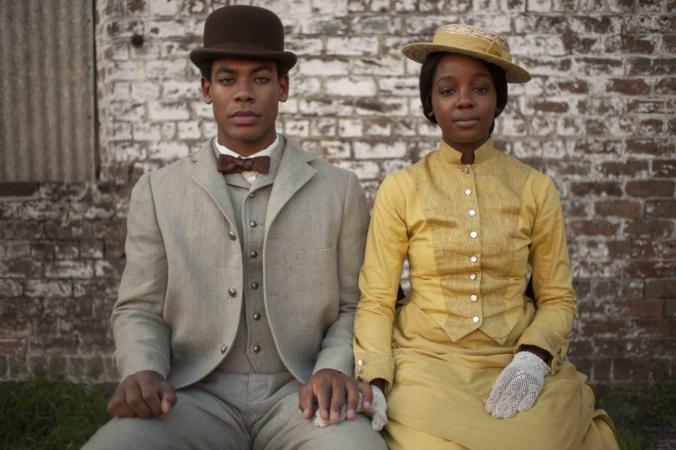Barry Jenkins’ newest project, The Underground Railroad, is on Amazon Prime as his latest work following If Beale Street Could Talk and Moonlight.
For the series, Jenkins reteamed with Moonlight producers (Brad Pitt’s) Plan B, and Adele Romanski, to adapt the Colson Whitehead novel, which chronicles a young enslaved woman’s adventures as she makes a desperate bid for freedom in the antebellum South.
The Underground Railroad stars Thuso Mbedu, Chase W. Dillon and Joel Edgerton. Aaron Pierre, William Jackson Harper, Sheila Atim, Amber Gray, Peter De Jersey, Chukwudi Iwuji, Damon Herriman, Lily Rabe, Irone Singleton, Mychal-Bella Bowman, Marcus “MJ” Gladney, Jr., Will Poulter and Peter Mullan also star.
Ahead of the series premiere, Shadow and Act spoke with Jenkins, Mbedu and Pierre about the series, the white gaze, if the show has shifted any since Jenkins first adapted it and much more.
Mbedu as the series’ heroine, Cora, is truly a breakout role on a worldwide scale for the South African television mainstay and International Emmy winner. She had specific preparation for the role and the series.
“I think I have to state first that I realized before when I jumped into preparation that a lot that I thought I knew was framed by a white supremacist gaze,” she told us. “So I had to unlearn all of that before jumping into the truth of the story that we were telling. My preparation was governed by the book. And as much as the screenplay itself is a little bit different to the book I wanted to bring the Cora from the book into the script.”
She continued, “I read the book over and over again, but I consumed a lot of raw material that I could find on the net. Barry sent me stuff to read. Barry sent me stuff to listen to, and that I can confidently say, I think I did too much research though. To the point where I had to consciously tell myself to step away from it, do something else, work on Cora’s handwriting. I had other stunts, things that I had to do, but that was all informing the character from the jump. And then when the other people arrived, having those discussions with them because what I’m learning might be a little bit different from what they’re learning and then merging those worlds to start telling the story.”
Though Whitehead’s book was released in 2015, it predated a lot of the Black Lives Matter protests of that year as well as the uprisings of 2020. For Jenkins, the same lens can be applied from when the book came out. He spoke more about what he told Shadow and Act in an extensive interview back in January that coincided with one of the show’s teaser releases.
“To be honest, that if there was a great shift, it was when the actors inhabited the characters, I think being in the field actually making it,” he explained. “Being out there, actually making the show and actions, these wonderful actors, giving body to the characters that was when the next evolution of the piece kind of arrived. I think unfortunately, Colson wrote a book in probably 2015 that was about, let’s say 1850 that now we’ll be seeing the show in 2021. And at every point on that timeline for things that we’re dealing with, they’re all relevant. And so it’s not that there have been some great shifts, especially when it comes to things like that. I want to get a 10-year, 20-year, 30-year sample and see if things have actually shifted. Otherwise, I think it’s just too acute and we’ll all just have to sort of keep our fingers on what is happening. What has been happening for the entirety of my life that I’ve felt like hasn’t been addressed, that I feel like is being allowed to proliferate. And what is the work that I’m creating? What does it say about that? And to me, that was consistent from the beginning all the way until maybe two weeks out from release, all the way out to now.”
As Mbedu is South African and Pierre is British, the latter spoke about the experience of inhabiting the role of a Black American character.
He told us, “I think I was fortunate to have the novel and I was fortunate to have the series, but I think also just having conversations with African-Americans and their experiences really deepened my understanding of that specific experience of the diaspora. And of course researching, that deepened my well of knowledge and allowed me to just feel more equipped in tackling this story.”
“I cannot even attempt to compare myself to Caesar,” he continued. “To have that magnitude of strength and resilience, courage to not only be able to exist in those circumstances, but then to escape and go beyond them in pursuit of true freedom and true liberty, those characteristics are things that I can only dream of having myself. So I wouldn’t say there are any similarities, I would just say there’s a lot of admiration for the characters in this story, from my perspective.”
Barry Jenkins’ The Underground Railroad is streaming now on Amazon. Watch the full video interview below:

